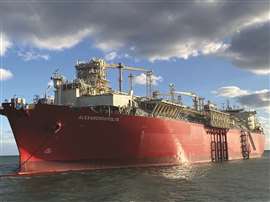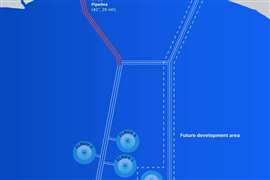Euro Gas Report
February 05, 2024
Anna Kachkova is an independent oil and gas writer based in Edinburgh, Scotland. She has over 13 years experience of covering the energy industry, including five years in Houston, Texas, as NewsBase’s North America editor. Her email address is: [email protected]
BULGARIA, SERBIA
Bulgaria, Serbia launch gas interconnector
The cross-border natural gas interconnector between Bulgaria and Serbia was inaugurated in early December at the Trupale compressor station near Nis, Serbia. The 170-km (106-mile) pipeline will allow Serbia to diversify its gas supplies and reduce its dependence on imports from Russia.
The interconnector has the capacity to transport 64 Bcf/y (1.8 × 109 m3/y) of gas, which accounts for around 60% of Serbia’s gas demand. It gives Serbia access to gas from Azerbaijan and volumes from the Alexandroupolis LNG terminal in Greece,
as well as to Bulgaria’s Chiren gas storage facility. The pipeline also has reverse flow capacity, which could allow Bulgaria to access additional gas from Western Europe.
Serbia has signed a deal to buy 14 Bcf/y (4 × 108 m3/y) of gas from Azerbaijan from 2024 and the country’s Srbijagas has also booked 11 Bcf/y (3 × 108 m3/y) of capacity at the Alexandroupolis LNG terminal, which is preparing to enter service early this year. (See later story)
CROATIA
Construction begins on Zlobin-Bosiljevo gas pipeline
Croatia’s Plinacro announced in late November that it had kicked off construction on the Zlobin-Bosiljevo gas pipeline. The 58-km (36-mile) pipeline is being built to allow for an increase in gas transmission from the Krk LNG import terminal to its current technical capacity of around 124 Bcf/y (3.5 × 109 m3/y).
Plinacro described the pipeline project as “extremely complex” and said it would cost EUR155mn ($169mn) to build, with funding provided by the Croatian government.
The contractor for building the project is a consortium of Croatian companies, led by Monter-Strojarske montaže. Work is scheduled to be completed in 2025.
The construction of the pipeline and the expansion of the LNG terminal’s capacity are expected to boost energy supply security both in Croatia and in the region more broadly.
CZECHIA
ČEPS completes acquisition of gas transmission operator Net4Gas
State-owned Czech electricity transmission system operator ČEPS completed the acquisition of natural gas transmission system operator Net4Gas Holdings in mid-December.
A Net4Gas subsidiary holds the exclusive license for gas transportation in Czechia. The company operates almost 4,000 km (2,486 miles) of gas pipelines, three border transfer stations, five compressor stations and 100 transfer stations described as being at the interface with national gas distribution.
Another Net4Gas subsidiary, Brawa, owns the Gazela gas pipeline, which connects to Germany.
The acquisition was made in a bid to bolster the country’s energy security.
GERMANY
McPhy wins electrolyzer supply contract for German compressor station
France’s McPhy Energy signed a contract in mid-December with Germany’s HMS Oil and Gas, a unit of HMS Bergbau, for the supply and commissioning of four electrolyzers to serve the Radeland compressor station in Brandenburg, Germany.
The compressor station is connected to a pipeline network running from the Baltic Sea to Southwest Germany and its position is considered strategic for converting the network to hydrogen service as part of a push to add hydrogen into the gas grid in Europe using existing infrastructure.
McPhy will supply four McLyzer 3200-30 electrolyzers with a combined capacity of 64 MW. The first will be brought into service at the end of 2025, with the other three set to be commissioned in 2027 under a second phase.
The electrolyzers will be supplied with electricity sourced from wind and solar plants near the station and will produce up to 10,000 tons per year of green hydrogen. The final investment decision (FID) for Phase I will be in 2024 and for Phase II end of 2025.
GREECE
Alexandroupolis LNG prepares to receive commissioning cargo
The Alexandroupolis LNG import terminal in Greece is preparing to receive its commissioning cargo ahead of its planned start-up in early March. The facility was initially expecting to receive the commissioning cargo on Jan. 20, but it was delayed as a result of weather conditions, and as of Jan. 22, a new arrival day for the cargo had not been announced.
This comes after the Alexandroupolis floating storage and regasification unit (FSRU) arrived at its permanent berth from Singapore in mid-December. Greece’s Gastrade said at the time that the FSRU’s arrival largely marked the completion of construction on the project.

The FSRU is connected to a high-pressure subsea and onshore gas transmission pipeline, which will deliver natural gas to the Greek transmission system once the facility is operational. The FSRU has a maximum sustainable regasification capacity of 194 Bcf/y (5.5 × 109 m3/y).
As Gastrade prepares to place the Alexandroupolis facility into service, efforts are also underway to expand pipeline capacity in the region in order to accommodate new volumes arriving in the form of LNG imports.
MAGAZINE
NEWSLETTER

CONNECT WITH THE TEAM








